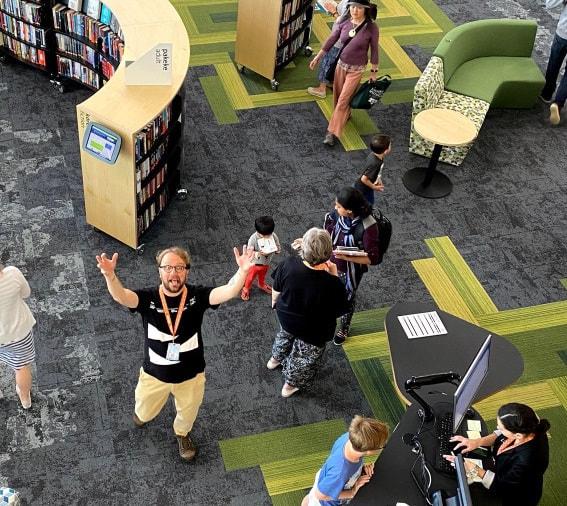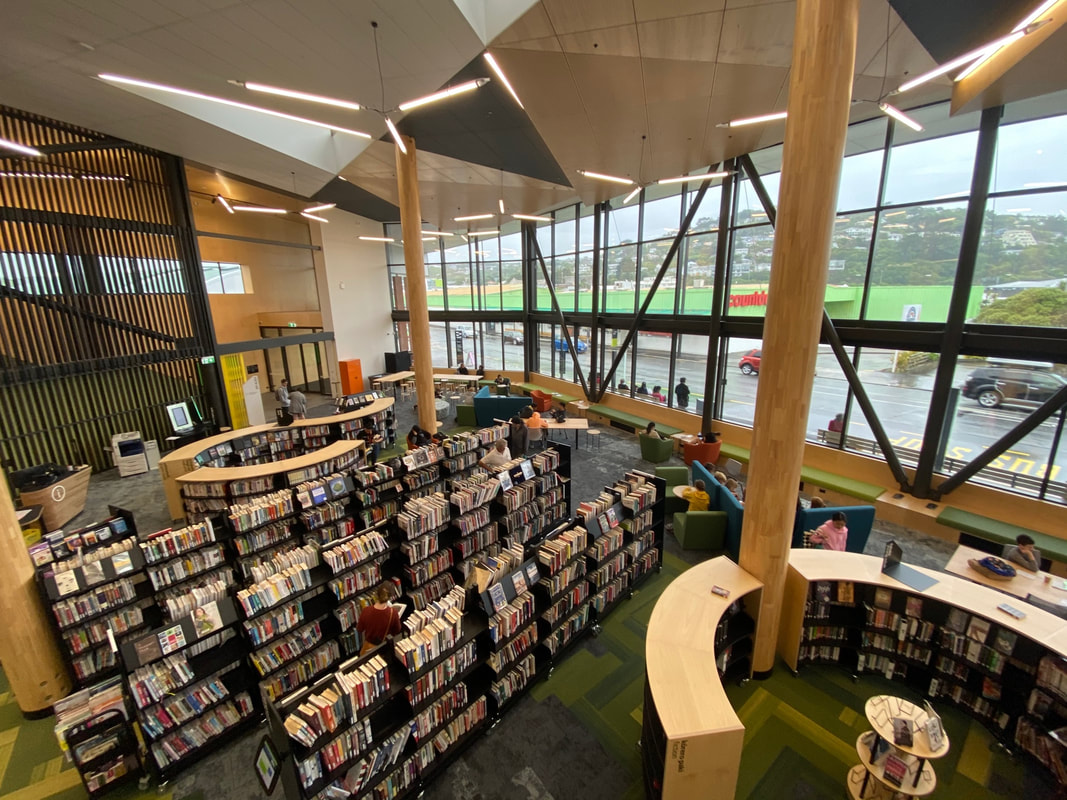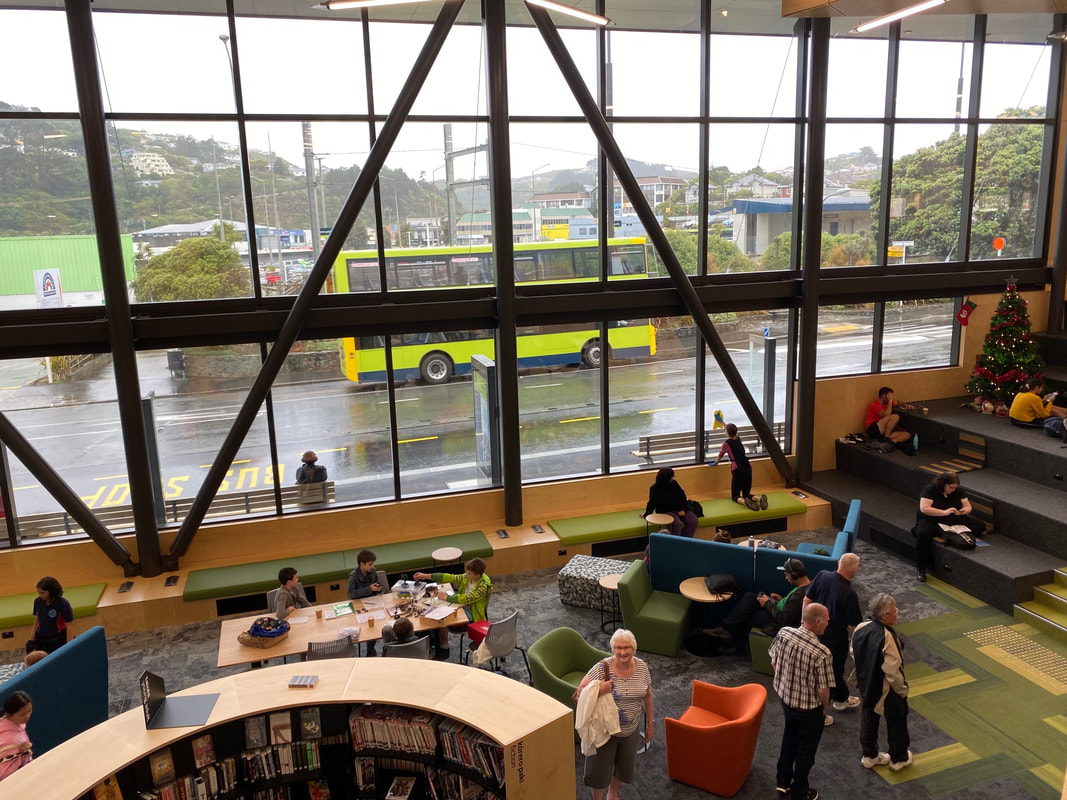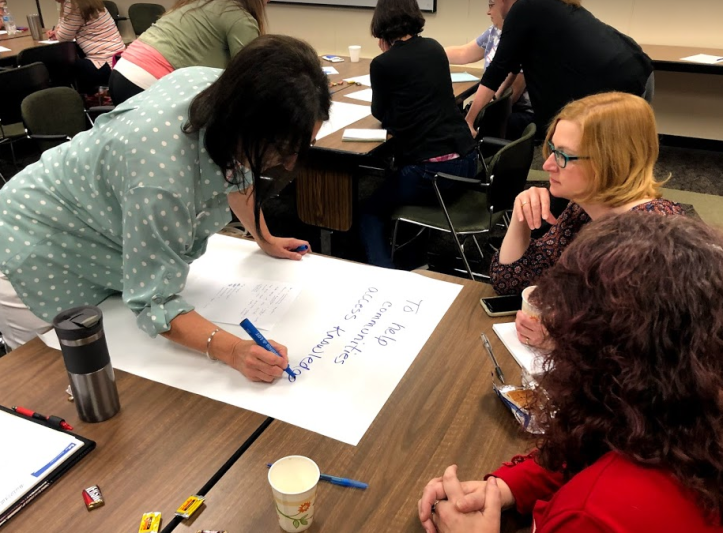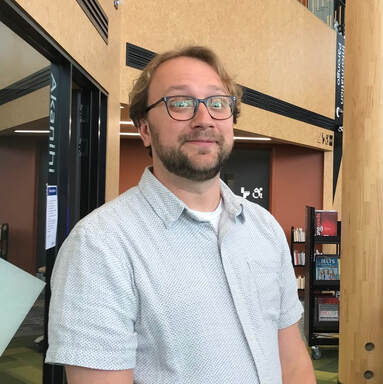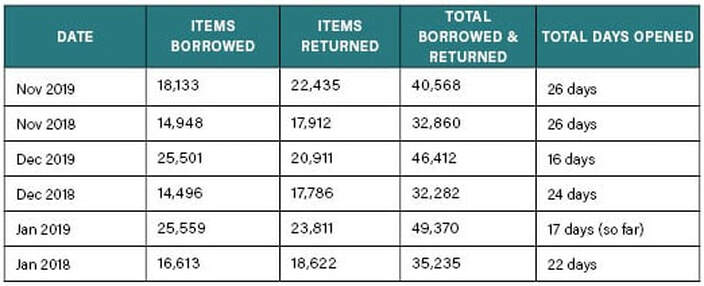Waitohi – New beginnings
|
Justin Hoenke is a Libraries & Community Spaces Team Leader at Wellington City Libraries which sees him lead and manage two public libraries and four community spaces. Helen Heath caught up with him recently to find out about the newly opened Waitohi Community Hub in Johnsonville, Wellington which Justin has blogged about. We also wanted to hear how he is settling in to his new role and life down-under.
Justin has recently moved to New Zealand from a small town in Pennsylvania, USA, but is no stranger to New Zealand shores as he visited for the LIANZA conference in 2015. In 2015 he spoke about youth services, kids, tweens, teens, and everything awesome that can happen in libraries. Justin has a string of awards and honours under his belt, such as Library Journal Mover and Shaker Advocate Award – 2013; Member of the Young Adult Library Services Association President's Task Force – 2013; Mentor, American Library Association Emerging Leaders Programme, January 2011; American Library Association – Emerging Leader Leadership Award, May 2010. Although he'll be the first to say that it is team work that gets things done and allows achievements. |
HH: Waitohi is a community hub that brings together the new library in Johnsonville, a public swimming pool (Keith Spry Pool), the Johnsonville Community Centre, a cafe, Whānau Manaaki Kindergarten, and a park. I’m excited about the community hub model for public libraries. I saw these recent articles about libraries in Australia and the United States thriving as community hubs. In Library Life, we’ve also featured New Zealand libraries, such as te Manawa striving for the same goals. Jane Hill, who played an important role in planning Waitohi, talks in this issue of Library Life about how these hubs bring together the best of the physical and digital worlds with interactive experiences. There’s definitely a Western trend towards the community hub model, where do you think Waitohi sits within the international space? Or are you keeping it simple with a local focus?
JH: I go to the global for the inspiration but when it comes down to it, I listen to the community and what it needs, because I’ve been in libraries before where globally they’ll be saying ‘We need 3D printers and full body scanners so we can 3D print life-size replicas of ourselves’ but then the community doesn’t need that. So, it’s good to be aware of those possibilities but also best to listen to your community and keep it real. What good is all this technology if nobody wants it? For me, being new to New Zealand, I think it is especially important for me to listen to the community because, even though it’s similar, it’s quite different, so I’m bringing a whole mindset of knowing what the US wants and where it’s going, but here is completely different.
HH: There’s bound to be some cross-over and some things that catch you unawares?
JH: There’s a lot of weird little things that I’m like, ‘Oh! Okay’
HH: Such as?
JH: I’m amazed at the self-service model that’s being implemented here. People are a lot more responsive to that in New Zealand. Whereas, I feel that if we tried to do that in America, there might be a little grumpiness?
HH: From what I can tell the States are very much service orientated and, going by my experience in New Zealand retail, we can sort of hide from staff, thinking ‘I can do it myself, don’t ask me anything!’ Maybe we’re an introverted nation?
JH: New Zealanders are a lot quieter than people from the States, but I like that because I’m an introverted extrovert or an extroverted introvert – something like that!
HH: It must be strange moving to a place that speaks the same language and has lots in common with your homeland yet has odd points of difference. I thought your tweets about milk bottles and taps were hilarious. What sorts of things are different here that you just were not expecting?
JH: There’s a lot of weird little things that I’m like, ‘Oh! Okay’
HH: Such as?
JH: I’m amazed at the self-service model that’s being implemented here. People are a lot more responsive to that in New Zealand. Whereas, I feel that if we tried to do that in America, there might be a little grumpiness?
HH: From what I can tell the States are very much service orientated and, going by my experience in New Zealand retail, we can sort of hide from staff, thinking ‘I can do it myself, don’t ask me anything!’ Maybe we’re an introverted nation?
JH: New Zealanders are a lot quieter than people from the States, but I like that because I’m an introverted extrovert or an extroverted introvert – something like that!
HH: It must be strange moving to a place that speaks the same language and has lots in common with your homeland yet has odd points of difference. I thought your tweets about milk bottles and taps were hilarious. What sorts of things are different here that you just were not expecting?
|
JH: Yeah, the milk bottles, the boiling water taps, and just words that are not used in the US. Today, the word creche came up and I’d never heard that word before in my life, so often in meetings I do a quick google on my phone. But slowly and surely I’m getting the hang of all the colloquial things. Even in the States we have regional differences, I’m from Pennsylvania and instead of saying ‘You all’ or ‘Y’all’, we say ‘Yinz’.
HH: Oh! And here we say ‘Youse’. JH: I haven’t heard that one yet! So, yeah, those little things. And the Māori language is big. I find myself walking along and every time I see a Māori language sign I try to stop and pronounce it out loud to get better at it. I probably look like a crazy person with earbuds in. So, it’s just like those little things, you know, going into supermarkets where things are in litres instead of gallons, clothesline hangers – clothes pins – are called pegs. Finding the common language – that’s been interesting. HH: It’s funny how exhausting all those little things are – they add up, You can’t just assume you can walk into a shop and know where to find things – it takes a while for your energy levels to catch up on all those little things. JH: I didn’t budget for that energy too, we came here and I started work five days later, still jet-lagged. For a full two months I was still jet-lagged. But I was brought up very blue-collar American, where you work and then you die, basically. I know that’s not healthy but you hear your parents in the back of your head saying ‘You can’t take more than five days off a year!’ If I were to do things differently I would have settled in for a month or so first and then got to work. For this project it was important to be onboard as early as possible. My original start date was October 7 and we only had to push back a week but that was only two months before Waitohi opened up and this project has been going on for a while – about two years? HH: Where did you see the job advertised? JH: I think it was through LIANZA? When I came here in 2015 I fell in love, I liked the people, I liked the place and I liked the way of life. My family and I have been searching for that perfect place that fits who we are – we’re kind of American but not really. It just feels right here. HH: The last place you worked in the States was quite a small rural library wasn’t it? JH: Yeah, very small. We had nine staff total, one small building. The city was about 5,000 people but the larger service area was about 14,000. I would say that’s pretty tiny. In baseball we would call it the little league. It was a good place for me to become manager and strategic leader. HH: How does that translate to this role? JH: This role is a lot more strategic, thinking about where libraries services are heading, how we can get there – planning, working within the structure of the council. There’s not as much day-to-day management in this role. Interestingly, with a new building that kind of input has been needed a fair bit – how do we work here? |
That’s been a big question we’re asking ourselves. I don’t think we have the answer yet. It was so busy the first month we were open. I’ve never worked in a library that was that busy. There was no good model for how this would work because there was just so much borrowing and returns especially. We could have had triple the staff and it would have still felt tiring and overwhelming. But we got through it all and things have evened out. It’s still busy but not completely overwhelming. I’m excited for the school holidays to end so the staff can get some downtime.
HH: How did you get into library work?
JH: I met my wife Haley and her mother had worked in libraries and was thinking of going back to do her Master’s degree. She’s just an awesome human being, I don’t know if it’s weird to say my mother-in-law is one of my best friends but she is. She said ‘You’d be really good in libraries, especially with teenagers because you like video games and music and nobody does that well in libraries.’ And I said – ‘well I’ll give it a shot.’ I started as a shelver on the circulation desk and they’d give me teen things to do on the side, which went well. The administration wanted to know what the secret sauce was for my success – I just listened to them and did the things that the teenagers wanted. They basically wanted pizza, a place to play guitar and sing and play video games. From there I got my Masters and a job as a teen librarian, then a job managing a brand new teen library and so on.
HH: One of the LIANZA conference attendees from 2015 had this to say about your presentation:
HH: How did you get into library work?
JH: I met my wife Haley and her mother had worked in libraries and was thinking of going back to do her Master’s degree. She’s just an awesome human being, I don’t know if it’s weird to say my mother-in-law is one of my best friends but she is. She said ‘You’d be really good in libraries, especially with teenagers because you like video games and music and nobody does that well in libraries.’ And I said – ‘well I’ll give it a shot.’ I started as a shelver on the circulation desk and they’d give me teen things to do on the side, which went well. The administration wanted to know what the secret sauce was for my success – I just listened to them and did the things that the teenagers wanted. They basically wanted pizza, a place to play guitar and sing and play video games. From there I got my Masters and a job as a teen librarian, then a job managing a brand new teen library and so on.
HH: One of the LIANZA conference attendees from 2015 had this to say about your presentation:
I loved his energy, his passion for the profession and what we do as individuals within the wider profession. I know I wasn’t the only one who wanted to work for Justin after hearing him speak with such passion. It was great that someone wanted to shout out about how amazing his staff were, and what they contributed to the community. So much better than simply talking about how great the services are that libraries offer (not that they’re not, just that there is more to a library than just its contents). Yet, you said on Twitter: Waitohi breathes life into my community minded soul. I lost the passion for all of this years ago. I’m finding it again. Thank you.
Can I ask what happened between 2015 and 2020? JH: There’s such an energy in working with youth and kids and there’s more of a blank slate in what you can do – you can try out different things. Coming to a small town and being the manager, the public face of the library, I think that might have been where I lost the passion, because I had to do things like create a timesheet format. So, for a while there my brain completely reversed itself. Youth service is the creative side – the right brain – and I had to jump into the left brain. I’m always trying to get a balance between left and right. I want to be able to access both and have them talking to each other. It’s so hard. In just the three months I’ve been here, it’s been tough but I can see myself getting better at that balance. This space is really good for getting back to what I had with my right brain work but I seem to be able to keep the left brain going as well. HH: So you’re happy to be moving into more strategic planning in your work? JH: Yeah, it’s neat to be listened to – to have a seat at the table and be able to say if something isn’t working or ‘have you ever tried it this way?’ |
|
Every library needs a kick sometime. Clients needing to pay for internet use here is very unusual for me, so having a seat at that strategic table and being able to question it is good. It’s a process – you say the things, you plan for the things and then you hopefully make those things happen. I like that – being an instigator, a nudger. But also making sure to check back in every year to ensure things are working well.
HH: How do you top up that supply of ideas? I know you’re on Twitter and you blog, you’re obviously reading international literature from the library sector. Do you have some top tips for our readers for keeping your mind fresh for strategic thinking?
JH: For me, I take in as much as I can through work. I don't read so much of the American literature, probably because I’ve had enough of it. I see the same conversations happening and not a lot of action. Twitter is still the best as well as the worst. Sometimes there’s great ideas and sometimes you feel like it’s not that safe of a place to say things. But as far as information coming out about what people are doing, you hone into those unique people and you follow them and make your lists. You see what those people are doing, what they’re trying, to me that’s a great tool for finding information. Then I think about it all the time after I read about it and learn about it, then have conversations with people at work about it, see how they react.
I don’t have a car here, which is the most un-American thing ever! So, I do a lot of walking and taking public transport. It’s so good having that time to process, that in-between time is great for thinking time. I know it’s a simple little thing but I think the best thing that people can do to understand these new trends is to learn about them and then give yourself time to think. I don’t think we acknowledge how much thinking goes into this work, we feel like we always have to move and do and go but that reflection time is really big too.
HH: I really agree! If you never schedule in some downtime to reflect and gather our thoughts, to look back at things and contemplate then you’re never learning from anything.
JH: I think the internet’s brought about that change, everything’s evolving so rapidly that you kind of have to do, do, do to get to the forefront of things but I like to think that we are starting to recognise that need to reflect.
HH: Maybe we just need to reflect more frequently? So we don’t crash and burn.
JH: I think it’s good for people to push themselves. I know for me, this move, the adjustment to the new job, the new country, I learned a limit in myself that I’d never seen before and I wouldn’t have got there if it wasn’t for pushing myself. I have to go home on the weekends and not talk to anybody!
HH: I know it’s early days but how does this new job compare with your previous role back in the States? What lessons did you learn there that you think will be useful here?
JH: For me, I take in as much as I can through work. I don't read so much of the American literature, probably because I’ve had enough of it. I see the same conversations happening and not a lot of action. Twitter is still the best as well as the worst. Sometimes there’s great ideas and sometimes you feel like it’s not that safe of a place to say things. But as far as information coming out about what people are doing, you hone into those unique people and you follow them and make your lists. You see what those people are doing, what they’re trying, to me that’s a great tool for finding information. Then I think about it all the time after I read about it and learn about it, then have conversations with people at work about it, see how they react.
I don’t have a car here, which is the most un-American thing ever! So, I do a lot of walking and taking public transport. It’s so good having that time to process, that in-between time is great for thinking time. I know it’s a simple little thing but I think the best thing that people can do to understand these new trends is to learn about them and then give yourself time to think. I don’t think we acknowledge how much thinking goes into this work, we feel like we always have to move and do and go but that reflection time is really big too.
HH: I really agree! If you never schedule in some downtime to reflect and gather our thoughts, to look back at things and contemplate then you’re never learning from anything.
JH: I think the internet’s brought about that change, everything’s evolving so rapidly that you kind of have to do, do, do to get to the forefront of things but I like to think that we are starting to recognise that need to reflect.
HH: Maybe we just need to reflect more frequently? So we don’t crash and burn.
JH: I think it’s good for people to push themselves. I know for me, this move, the adjustment to the new job, the new country, I learned a limit in myself that I’d never seen before and I wouldn’t have got there if it wasn’t for pushing myself. I have to go home on the weekends and not talk to anybody!
HH: I know it’s early days but how does this new job compare with your previous role back in the States? What lessons did you learn there that you think will be useful here?
|
JH: I remember when I got to my previous job, I was supposed to get an office on the second floor away from everybody but I wanted to be with people. Here, I’m with people quite a bit but I recognise I need a balance with some time away from people – I’m trying to find a balance between connecting with the staff and connecting with the public but also having my office up in the sky.
HH: Being in the thick of it seems to be an important part of how you work. JH: As a manager and a leader, that was one of the things the last job taught me was that it’s not all on you – you’re a team. HH: I saw some notes you’d written after attending a workshop with Matt Finch called Library Island. You said: The Future is Unwritten…we make it and can have a real impact. This is a great way to combat fear/anxiety. Uncertainty doesn’t have to equal anxiety: it can equal hope and change. Do the best you can in the time you’ve got. |
I love that sentiment! This issue of Library Life magazine is celebrating 110 years of LIANZA and 25 years of partnership with Te Rōpū Whakahau, so the theme is ‘Looking back, looking forward.' What do you think are the major challenges facing libraries this decade?
JH: I’ve noticed that Amazon doesn’t have quite the same reach here as it does in the States. At my last library we got everything through Amazon because we were small, we had a good budget but anything that chipped into buying books for the collection, like shipping costs, made it difficult. These big forces like Google and Amazon are becoming such a big part of our lives. There are some good things that come with it but also they’re like invasive plants.
HH: The independent bookstores in New Zealand are actually doing better than ever. Barnes & Noble came to town then boomed and busted, the last ones left standing are the small independants. It’s interesting how that’s played out here.
JH: I’ve noticed that Amazon doesn’t have quite the same reach here as it does in the States. At my last library we got everything through Amazon because we were small, we had a good budget but anything that chipped into buying books for the collection, like shipping costs, made it difficult. These big forces like Google and Amazon are becoming such a big part of our lives. There are some good things that come with it but also they’re like invasive plants.
HH: The independent bookstores in New Zealand are actually doing better than ever. Barnes & Noble came to town then boomed and busted, the last ones left standing are the small independants. It’s interesting how that’s played out here.
|
JH: It seems like those independants have such a strong community and user focus. When we talk about community and users and good feelings there’s not a lot of data to back that up. It would be interesting to see if we can tell that the large stores are impersonal and these community run stores are very personal, how does that correlate to them being more successful? HH: It comes down to the staff I think. When staff know what they’re talking about, care, and are prepared to take the time to actually look something up – give you some proper customer service. We do like our self checkout but when you need assistance – research skills, things like that. If you know you can trust the staff – they get your taste and it’s not just a sausage factory where they are trying to push you out the other side – I think people really respond to that. JH: We need a study in good vibrations. How do good vibrations equate to success? How do you measure good vibrations? HH: Brilliant! We do need someone to study that! |
|
JH: Other things I’m thinking of as major challenges… We said this ten years ago about things becoming increasingly digital – how does that affect the footprint of our physical collection. I think that’s still something to think about. I think people are always going to want physical books, even the younger generations, so that’s not going away. But I do think things are going to get smaller, physically – so how should our space reflect that?
HH: Some people seem to think that libraries should keep all books forever, which is just not physically possible. There are so many books being published every week and that’s just in New Zealand – where do you put them all? Even digital files need to be stored on a physical server, the cloud isn’t just the ether – it’s huge underground caverns filled with server farms. Do we really need to keep everything forever? JH: That’s a question my whole family asked ourselves when we moved over here – what do we keep? It’s so hard because you have emotional attachment to things but I found myself appreciating the things that I have, and the things I did bring over, more than I did when I was back in the States and I had a lot. Can we reframe the public perception of what a library is? We’re all doing a pretty good job. It’s not an archive. I think the public are finally coming around to the fact that public libraries are a community space, that there’s a finite amount of things and that libraries do events and programmes. But then how do we reshape the conversation around what the other libraries – such as academics and special libraries – do. Are their collections more like archives? HH: We’ll there’s been a lot of outrage around weeding in tertiary libraries recently. |
|
JH: Things change all the time. I’ve worked in libraries where they didn’t weed the collection because they were afraid that people would be mad. But then you have books on the shelves that say Pluto is a planet! There’s a great Twitter feed – ‘Awful library books’, which really demonstrates some of the outdated junk that weeding gets rid of. They are curiosities but you don’t need one in every library.
HH: Thanks for talking with us, is there anything else you’d like to say?
JH: Thanks for talking with me, it’s so nice. To the whole country – thanks for having me!
HH: Well, the whole of New Zealand library twitter was very excited to welcome you!
JH: I was stunned by that, because I always feel kind of foolish saying ‘Oh, I got this new job’. You know, you put it up on your website and you want people to be happy but you kind of feel like a goof, it’s like self promotion. But it felt good to be welcomed by a country. I’d had my eye on New Zealand for a while, my wife too. We always felt like we were born in the wrong country.
JH: Thanks for talking with me, it’s so nice. To the whole country – thanks for having me!
HH: Well, the whole of New Zealand library twitter was very excited to welcome you!
JH: I was stunned by that, because I always feel kind of foolish saying ‘Oh, I got this new job’. You know, you put it up on your website and you want people to be happy but you kind of feel like a goof, it’s like self promotion. But it felt good to be welcomed by a country. I’d had my eye on New Zealand for a while, my wife too. We always felt like we were born in the wrong country.
Unfortunately, we don’t have exact visitor numbers from the opening, however we did an estimate (using hand held clickers) that the opening weekend saw about 3,250 visitors on the first day, and approximately 1,250 on the Sunday (15th Dec).
Since Waitohi opened, as at 5.00pm on the 21st of January, we have had:
Since Waitohi opened, as at 5.00pm on the 21st of January, we have had:
- 1,640 people attend events for children and youth
- Another 299 people attend events for adults or for mixed adult/children audiences
- In the 16 days we were open in December, we have issued 13,245 items from the children’s collection (compared to 8,577 in December 2018 – a 54.4% increase in half the time).
Justin also contributed to our Six Hot Picks column in this issue of Library Life, have a read!
You can find Justin Hoenke online at justinthelibrarian.com and on Twitter: @justinlibrarian
You can find Justin Hoenke online at justinthelibrarian.com and on Twitter: @justinlibrarian

